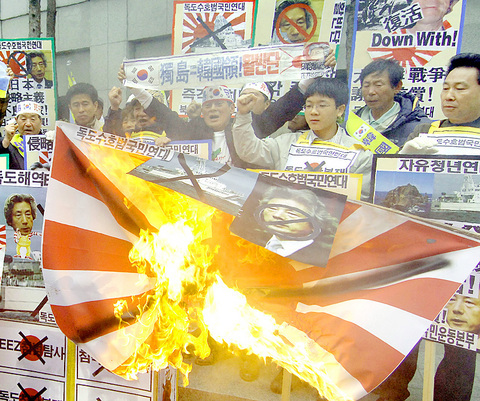Japan yesterday postponed an ocean survey of islands controlled by South Korea and diplomats of the neighboring countries tried to defuse the emotionally charged row.
Tokyo may dispatch a Foreign Ministry official to Seoul to resolve a standoff over disputed islets, Prime Minister Junichiro Koizumi suggested yesterday.
News reports had earlier said Undersecretary for Foreign Affairs Shotaro Yachi may travel to Seoul as early as today to hold talks over the plan to survey resource-rich waters near the islets, which Japan also claims.

PHOTO: AFP
When asked about the reports, Koizumi said Japan would do its utmost to reach an amicable solution. But both sides refused to back down.
"We want to avoid any unexpected event so we are holding talks at the level of vice ministers and ambassadors," Japanese Foreign Minister Taro Aso said earlier yesterday.
South Korea maintained its show of force, dispatching a surveillance plane to the disputed area, putting its coast guard on full alert and summoning the Japanese ambassador for a 40-minute dressing down.
Hundreds of riot police guarded the Japanese embassy in Seoul as a group of about 20 protesters burned Japanese flags and portraits of Koizumi, one day after an activist attempted ritual suicide.
The Japanese coast guard said it had delayed the departure of the two ships to the islands -- called Dokdo in South Korea and Takeshima in Japan -- citing strong winds.
The ships have been docked since Wednesday just off the port of Sakaiminato in the southeast.
"We have not decided whether to start the survey," coast guard spokesman Naoki Mori said. "We've been consulting with the central government."
But Japan this week announced it would take measurements for a map of features on the seabed of the disputed islands. Tokyo said it needed the survey to submit a counterproposal to South Korea at a June meeting of the International Hydrographic Organization. At the conference, the group will consider using Korean names for the underwater features of the islands.

A fire caused by a burst gas pipe yesterday spread to several homes and sent a fireball soaring into the sky outside Malaysia’s largest city, injuring more than 100 people. The towering inferno near a gas station in Putra Heights outside Kuala Lumpur was visible for kilometers and lasted for several hours. It happened during a public holiday as Muslims, who are the majority in Malaysia, celebrate the second day of Eid al-Fitr. National oil company Petronas said the fire started at one of its gas pipelines at 8:10am and the affected pipeline was later isolated. Disaster management officials said shutting the

US Vice President J.D. Vance on Friday accused Denmark of not having done enough to protect Greenland, when he visited the strategically placed and resource-rich Danish territory coveted by US President Donald Trump. Vance made his comment during a trip to the Pituffik Space Base in northwestern Greenland, a visit viewed by Copenhagen and Nuuk as a provocation. “Our message to Denmark is very simple: You have not done a good job by the people of Greenland,” Vance told a news conference. “You have under-invested in the people of Greenland, and you have under-invested in the security architecture of this

Japan unveiled a plan on Thursday to evacuate around 120,000 residents and tourists from its southern islets near Taiwan within six days in the event of an “emergency”. The plan was put together as “the security situation surrounding our nation grows severe” and with an “emergency” in mind, the government’s crisis management office said. Exactly what that emergency might be was left unspecified in the plan but it envisages the evacuation of around 120,000 people in five Japanese islets close to Taiwan. China claims Taiwan as part of its territory and has stepped up military pressure in recent years, including

UNREST: The authorities in Turkey arrested 13 Turkish journalists in five days, deported a BBC correspondent and on Thursday arrested a reporter from Sweden Waving flags and chanting slogans, many hundreds of thousands of anti-government demonstrators on Saturday rallied in Istanbul, Turkey, in defence of democracy after the arrest of Istanbul Mayor Ekrem Imamoglu which sparked Turkey’s worst street unrest in more than a decade. Under a cloudless blue sky, vast crowds gathered in Maltepe on the Asian side of Turkey’s biggest city on the eve of the Eid al-Fitr celebration which started yesterday, marking the end of Ramadan. Ozgur Ozel, chairman of the main opposition Republican People’s Party (CHP), which organized the rally, said there were 2.2 million people in the crowd, but